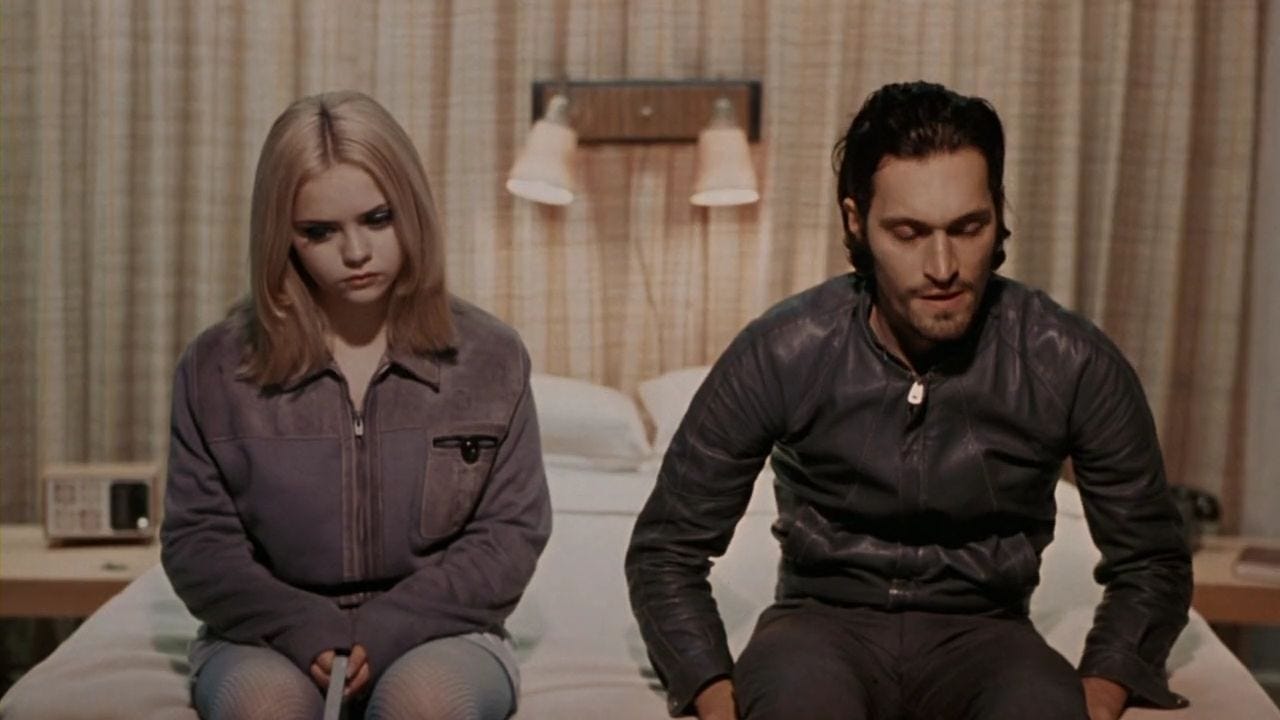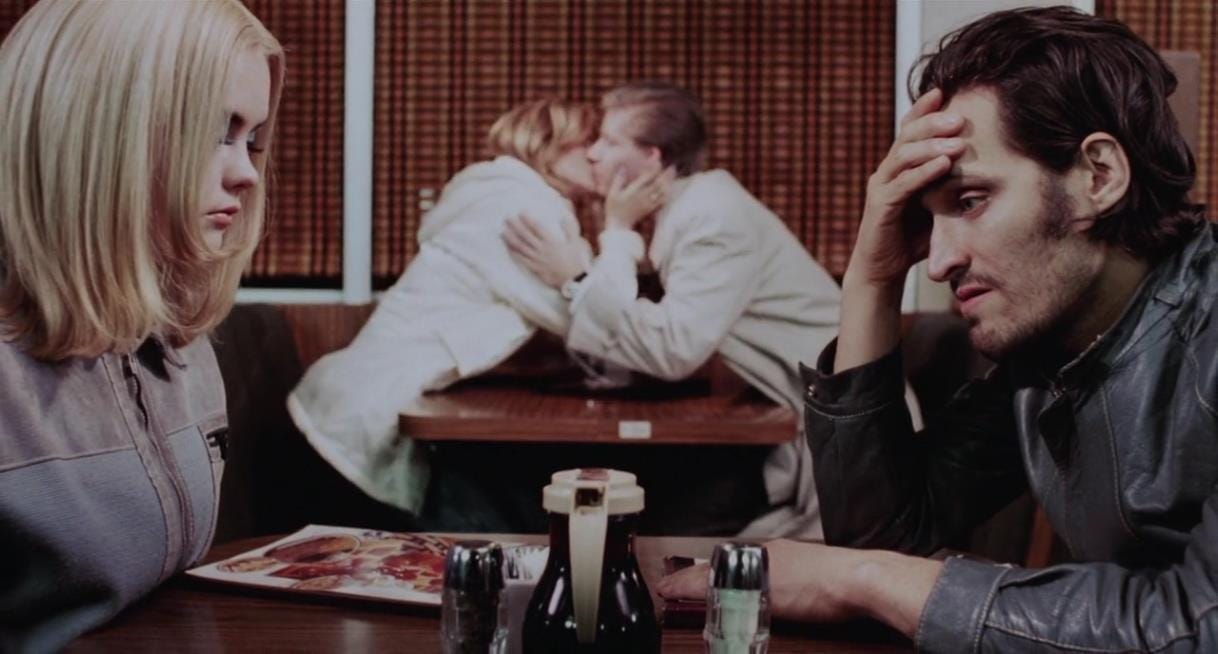Goddamn, Man-Child
Vincent Gallo's Buffalo '66—25 years after its debut—remains a raw and unflinching dive into the twisted depths of male alienation.
Vincent Gallo has a reputation as a chauvinistic reactionary with a dark, twisted sense of humor and a controlling - almost domineering approach to filmmaking. His off-putting public statements, bombastic online presence, and divisive body of work frequently leave a bad taste in the mouths of critics and audiences alike. His films are often written off as sexist and self-indulgent—Buffalo '66 is no exception. At first glance, the film seems nothing more than a hedonistic, misogynistic vanity project that glorifies toxic masculinity and emotional manipulation, but beneath its surface lies a raw, unsettling portrait of male vulnerability, neglect, and desperation.
In Buffalo '66, Gallo directs and stars as Billy Brown, a young man living on the margins of society. The film examines, through a cold, detached lens, the life of a man who has endured lifelong neglect and alienation. His intense yearning to be seen and loved contrasts with his actions, which only serve to further alienate him from those around him. Gallo's unflinching portrayal of Billy's psyche provides an unvarnished, uncomfortable window into the depths of male desperation and its societal ramifications. In Billy, we see the men in our lives who are repressed, detached and hard to reach. The film shines a light on the trauma that underpins much of male loneliness and alienation.
The opening scene frames Billy against an austere, frigid landscape, a visual echo of his internal desolation. Fresh from a prison stint—the result of a foolhardy Super Bowl bet—Billy emerges into the unforgiving Buffalo winter. Driven by an insatiable need for approval, he lies to his mother without provocation, telling her he has been away on important business and promises to introduce her to his wife. The problem is—there is no wife. Fate intervenes when he encounters Layla, whom he impulsively kidnaps to pose as his fictional wife — Wendy Balsam.
Enter Christina Ricci, who plays Layla, the embodiment of soft, angelic femininity. We first meet her in a tap-dancing class, dressed in a soft blue babydoll dress, her platinum blonde hair gleaming under the studio lights. Her eyeshadow glitters, her tap shoes sparkle, and her cleavage is ever-present—a figure both adorable and sexual, bratty and submissive. She embodies a male fantasy.
The film's central plot point may seem improbable at first: Billy kidnaps Layla, and instead of fleeing, she dutifully follows his commands. There are several moments where Layla has the opportunity to escape, yet she chooses not to. Her motivations, like much of her backstory, are left deliberately ambiguous, but her decision to stay might be more understandable than it appears. While many women are taught from a young age to fight or flee in dangerous situations, the reality is often more complex. As Marissa Korbel explores in her essay "Sometimes You Make Your Rapist Breakfast," women regularly placate their abusers as a survival strategy—a decision that may seem baffling from the outside but often serves as a means of self-preservation in threatening circumstances.
Still, we can only glean Layla’s motivations since her character is mostly a projection of Billy’s desires instead of someone who stands on her own. Layla’s compliance with Billy can be seen through this lens of survival, but there’s more at play. Throughout the film, she is not merely submissive—she appears to develop an odd sympathy for him. One pivotal scene occurs just before Billy returns to his childhood home to meet his parents and uphold the elaborate ruse he’s built. Feeling a deep wave of anxiety and panic, Billy sits on his parents’ porch, rocking back and forth and stating with a muffled breath that he feels like throwing up. Layla, seated beside him, asks if he’s okay—a moment that reveals her growing empathy for her captor. Billy responds by asking her to hold him for a second, but as soon as she reaches for him, he recoils, muttering, "Don’t touch me!"
This scene encapsulates the push-pull dynamic between the two characters and forces Layla into the role of emotional caretaker. She is continually asked to extend herself, to soothe Billy’s pain, despite his resistance. It’s as if Billy’s brokenness demands her healing. Billy’s emotional needs—and Layla’s role in fulfilling them—mirror the real-world expectation that women are responsible for healing men’s wounds even as men oppress and objectify them.
This expectation of women as emotional caretakers is particularly pronounced when comparing Layla to Billy’s mother, Jan, who is portrayed as shrill, unaffectionate, and self-absorbed. We first meet Jan in Billy’s childhood home, which is cluttered with Buffalo Bills memorabilia. While she claims excitement about seeing Billy and meeting his wife, her body language betrays her disinterest. The Buffalo Bills game plays in the background, and when Layla asks to see pictures of Billy as a child, Jan instead shows pictures of herself. Billy's father, equally detached, focuses more on doling out inappropriate hugs to Layla than acknowledging Billy's presence. These scenes in Billy’s childhood home accentuate the trauma underlying Billy’s alienation, with the blunt and disquieting way the scenes are shot underscoring the emotional neglect that shapes it. Jan’s recounting of never having missed a Buffalo Bills game—except on the day Billy was born—further intensifies the viewer’s discomfort and lays bare the profound roots of Billy’s emotional suffering
Layla, in contrast to Jan, is soft, pliant, and empathetic. She remains in her soft blue babydoll dress throughout the film, symbolizing everything Billy’s mother is not. This static portrayal reinforces the notion that Layla is less a fully realized character and more an embodiment of Billy’s—and by extension, Gallo’s—deepest desires. This dynamic is thoroughly illustrated in a surreal scene in the film where the background fades to black, and a spotlight illuminates Layla as she tap dances in a bowling alley. Her movements are delicate and tender, imbued with an innocence that feels out of place in the dreary world Billy inhabits. This moment further emphasizes her dreamlike, otherworldly presence, embodying the unattainable ideal Billy has constructed in his mind.
Later in the film, when Billy and Layla are at a diner, Billy’s unrequited childhood crush, the real Wendy Balsam makes a dramatic entrance. Wendy’s loud, boisterous nature sharply contrasts with Layla’s demureness highlighting the gulf between Billy’s fantasies and reality. Wendy’s overt sexuality—evident as she openly makes out with her partner in front of Billy and Layla—provokes Billy’s mounting anxiety. In the tense diner scene, Layla attempts to comfort Billy by disparaging Wendy, calling her “weird.” Billy, rejecting this pity, erupts in a rant about how he could have any woman he wanted, but dismisses them all by saying “Girls stink. They stink. They’re evil. They’re all bad. All of them.” Following this outburst, Billy flees the diner but eventually returns to Layla, apologizing for his behavior. This ongoing push-and-pull dynamic mirrors the central theme of the film, highlighting Billy’s struggle to reconcile his idealized fantasies with the complex reality of the women around him.
In both Wendy and Layla, we see contrasting facets of the male fantasy. Billy creates elaborate narratives to manage his trauma, and the women in his life, whether real or imagined, fulfill roles within these fantasies. Layla embodies everything Billy desires because she fits the mold he needs to address his emotional wounds. By introducing Layla to his parents under Wendy’s name, Billy's actions reveal that Wendy represents an unattainable ideal from his past, while Layla serves as the pliable figure who soothes his present emotional turmoil.
Yet, Wendy’s appearance in the diner serves as a painful reminder of Billy’s past failures. She barely remembers him despite the years Billy spent idealizing and fantasizing about her. The discomfort he feels in her presence—her unapologetic sexuality and confidence—reinforces the distance between his idealized notions of women and the reality he cannot navigate. Wendy’s loudness, her physicality, and her indifference all highlight what Layla’s character lacks: self-determination and a fully realized sense of self. Layla, pliant and passive, embodies the male fantasy because she doesn’t challenge Billy’s fragile sense of control.
Layla is Billy’s salvation, not because she is a character with agency, but because her love—however constructed—fills the void left by his parents. We never truly know her, because her being a fully formed character would dampen the fantasy. Billy’s salvation lies in her love, not in her personhood.
This dynamic will resonate with many women who pursue relationships with men. Early in relationships, a woman may feel loved and adored, caught in the rush of being “seen.” However, as the relationship deepens and unresolved traumas emerge, men who have done little to work through their issues with abandonment and self-loathing often try to punish women for not living up to the idealized version they’ve created in their minds. This punishment can range from emotional withdrawal and discarding to outright abuse, yet the underlying cause remains the same: a patriarchal disregard for women as fully human. Women are seen as vehicles for men to offload their trauma and support the fragile egos shattered by societal expectations.
In Buffalo '66, Billy embodies this destructive pattern. His unresolved "mother hunger"—the deep craving for maternal love and validation—leaves him bitter, hollow, and deeply insecure. He yearns for closeness and nurturing but simultaneously pushes it away, unable to reconcile his desire for connection with his fear of rejection. This push-pull dynamic, characteristic of avoidant attachment, is seen in Billy’s interactions with Layla. He craves her soothing presence and emotional support. Yet when she offers it, he recoils, sabotaging the very intimacy he desires.
For men like Billy, the trauma of abandonment leaves them trapped in a cycle of yearning and rejection. His need for love and attention is in constant conflict with his fear of being let down again, mirroring the broader way patriarchal norms teach men to view vulnerability as weakness. Layla, like many women, becomes a target of Billy’s inner conflict—expected to soothe his emotional wounds while being punished when she cannot live up to the impossible ideal of the nurturing, one-dimensional caretaker. This dynamic is a reflection of how society conditions men to offload their unresolved traumas onto women, expecting them to heal the unhealed parts of their souls while denying women their own humanity.
The closing montage of Buffalo '66 is pivotal. In a fantasy sequence, Billy imagines exacting revenge on the Buffalo Bills kicker, whom he blames for his ill-fated gambling bet and the collapse of his life. Billy envisions a murder-suicide, where after killing the kicker, he takes his own life. He imagines his parents' reaction to his death—only to see their indifference at his funeral. Even in death, they remain disengaged, confirming the painful truth he’s always known: their love was never truly his to have.
It’s in this moment of reckoning, standing at the edge of self-destruction, that Billy changes course. If even his death wouldn’t evoke their love, why bother with revenge? Why waste his life trying to right the wrongs of a past that will never offer him the validation he craves? In a moment of almost defiant clarity, he turns away from the violence and bitterness that have consumed him, realizing he still has the chance to find love in the present. He runs to a payphone and calls his friend Rocky, confessing with unexpected vulnerability, “I got a girl, I got a girl who loves me.”
This shift in the fantasy montage is a profound emotional pivot. For the first time, Billy acknowledges Layla’s love, something he’s been too damaged to fully accept. The montage presents a glimpse of hope—Billy’s fantasy of rejecting his trauma-driven impulses and instead choosing connection over isolation, love over revenge. In this imagined future, he sees that there’s a path out of his bitterness, a life where he can embrace the love that’s available to him now, rather than chasing validation from those who will never give it. While this moment feels triumphant for Billy, the lack of insight into Layla’s inner world leaves us uncertain about how this shift impacts her. With so little development of her character, we’re left to wonder if she shares in Billy’s moment of catharsis, or if she remains trapped within his expectations.
The film’s conclusion reveals a profound truth: men don’t just want to be loved—they crave a deep, all-encompassing love. In their quest to achieve this, they often resort to desperate measures. Gallo’s portrayal of Billy is unflinchingly honest, exposing the inner turmoil of men who feel abandoned by the world. Layla, the embodiment of Billy’s fantasy, is portrayed as otherworldly, beautiful and radiant. Still this depiction ultimately does a disservice to women, who, like men, long to be loved and fully seen for who they truly are.
Would Billy have loved Layla if she had been more than a projection of his desires? What if she had exhibited some of the same annoying traits as his mother—could he still accept her, flaws and all?
The problem with male fantasy is just that: it’s a fantasy. It fails to embrace the full humanity of women, and in that, everyone loses.
In the years since its release, Buffalo '66 has only grown in relevance. Its exploration of male alienation and the toxic behaviors that can stem from it feels particularly pertinent in an era where "incels" and other manifestations of male discontent have entered the cultural lexicon. The film serves as both a warning and a plea for understanding—a portrait of a man so desperate for connection that he's willing to fabricate it, even at the cost of another's autonomy.
As we watch Billy and Layla's strange dance of captor and captive, we're left with uncomfortable questions about the nature of love, the cost of emotional neglect, and the dangerous allure of fantasy. In the end, Buffalo '66 doesn't offer much in the way of answers. Instead, it leaves us with a chilling portrait of a man frozen in emotional adolescence, forever seeking the warmth of love in a world that feels as cold and unforgiving as a Buffalo winter. It's a testament to Gallo's vision that, even a quarter-century later, the film's icy heart still has the power to both captivate and disquiet its audience.
Thank you so much for reading! Please leave a like and comment if you enjoyed this piece. Till next time!





Wow this was so good